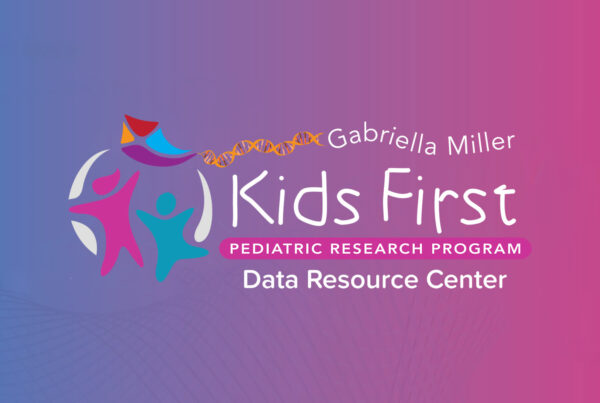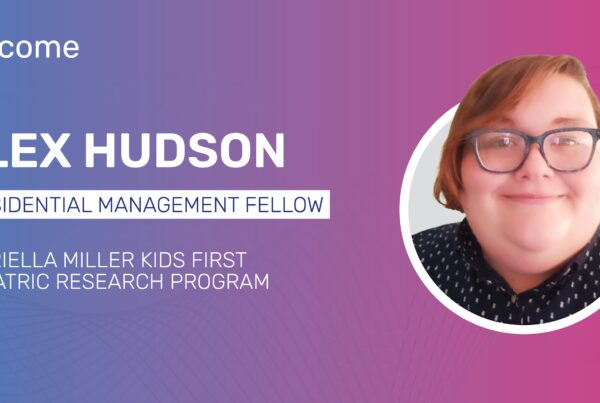Updates to the Kids First Data Resource Center – Fall 2021
Now in its fourth year, the NIH Common Fund-supported Gabriella Miller Kids First Data Resource Center (Kids First DRC), is a leading resource and platform for the advancement of our fundamental understanding of pediatric cancers and structural birth defects. Recently surpassing 1.4PB of multi-omic data derived from more than 20,000 pediatric research participants, the Kids First Data Resource continues to fulfill its purpose, providing more than 2,400 registered portal users with the tools and data necessary to make the kinds of discoveries that can lead to better therapies and interventions for children in need.
New Data within the Kids First Data Resource
Since our last reporting, a significant amount of new data has been added to the Kids First Data Resource Portal, which now contains 1.44PB of data across 28 datasets. These data relate to three new studies that have been added this quarter, plus additional data added for the Kids First Microtia-Hispanic study led by Dr. Jonathan Seidman of Harvard Medical School.
For the Kids First study, Genomic Analysis of Esophageal Atresia and Tracheoesophageal Fistulas and Associated Congenital Anomalies, led by Dr. Wendy Chung of Columbia University Health Sciences, 7.45TB of Single Nucleotide Variants and Sequencing Reads were added to the portal in August of this year. Data include aligned reads, gVCF, and variant calls from 336 study participants.
Also in August, the Kids First study, Genomic analysis of a cohort with infantile hemangiomas associated with multi-organ structural birth defects, led by Dr. Dawn Siegel of the Medical College of Wisconsin was added. Comprising over 20TB of Single Nucleotide Variants, Sequencing Reads, and others, the data represent 237 study participants and 79 trio family groups. Data types in this study include aligned reads, variant calls, gVCF, and others.
Finally, over 92TB of data were added this quarter for the Kids First study, Whole genome sequencing of nonsyndromic craniosynostosis, led by Dr. Simeon Boyd of the University of California Davis. Derived from 949 study participants, this dataset contains Single Nucleotide Variants and Sequencing Reads, including aligned reads, variant calls and gVCF.
Combined, these new data have grown the Kids First Data Resource by more than 120TB, representing over 1,500 pediatric patients and more than 600 families.
New X01s Announced
This summer, the NIH Common Fund’s Gabriella Miller Kids First Pediatric Research Program was pleased to announce the selection of a seventh set of childhood cancer and structural birth defect cohorts for whole genome sequencing. These cohorts will add to the number and diversity of conditions represented by the program.
They include:
- The Genomic Basis Of Structural Birth Defects Associated With Chromosome 18 Copy Number Changes PI: Jannine De Mars Cody; University Of Texas Health Science Center
- The Genetic Basis Of Treatment Outcomes And Late Effects After High-Risk Neuroblastoma PI: Sharon Diskin; Children’s Hospital of Philadelphia
- Expanding Our Understanding Of The Role Of Noncoding Variation Causing Congenital Heart Defects PI: Bruce Gelb; Icahn School Of Medicine At Mount Sinai
- Rnaseq In Cornelia De Lange Syndrome, Related Diagnoses And Structural Birth Defects PI: Ian Krantz; Children’s Hospital of Philadelphia
- Whole Genome Sequencing Studies Of Multiplex Nonsyndromic Cleft Lip/Palate Families PI: Ariadne Letra; University Of Texas Health Science Center Houston
- Genetic Overlap Between Anomalies And Cancer In Kids In The Children’s Oncology Group: The COG GOBACK Study PI: Philip J. Lupo; Baylor College Of Medicine
- Germline And Somatic Variants In Pediatric AML PI: Soheil Meshinchi; Fred Hutchinson Cancer Research Center
- Germline And Somatic Disease Modifiers Of Pediatric Brain Tumors PI: Adam Resnick, PhD; Children’s Hospital of Philadelphia
- Genomic Analysis Of Histiocytosis PI: Michael Scheurer; Baylor College Of Medicine
- Discovering The Timing And Origins Of Bone And Soft Tissue Cancers PI: Adam Shlien; Hospital For Sick Children
View the full list of Kids First X01 projects at https://commonfund.nih.gov/kidsfirst/X01Projects *Sequencing of this project is supported by the NIH Childhood Cancer Data initiative and the data will be shared through the NCI Cancer Data Service and made available on the Kids First data portal.
Functional Improvements and New Tools for Analysis
Highlighted in our last report, the Kids First portal’s Variant Database allows users to quickly search for specific gene variants. This allows them to identify participants from across all Kids First datasets with the same mutation, apply for dbGaP access, and more easily conduct cross-disease research. This tool has been greatly expanded with the addition of new datasets. The initial launch of this was limited to just six studies but the Kids First team is currently working to have all released Kids First studies consented for General Research Use. Looking to add seven more studies soon.
Support for Kids First Portal Users
The Kids First DRC’s monthly Open Office Hours continue on, occurring on the second Tuesday of every month, from 3:00 to 4:00pm/ET. At our Office Hours sessions, attendees have the opportunity to interface with members of the Kids First DRC’s data operations and bioinformatics teams, and to pose questions related to their Kids First projects within the Data Resource Portal, CAVATICA, and PedcBioPortal. Kids First portal users, as well as those interested in learning more about the Kids First Data Resource, are invited to attend – from beginners to advanced investigators.
Recent sessions have focused on the Kids First clinical data; using phenotypes to build better queries in the Explore Data tool for analysis. Those interested in joining these monthly sessions can contact the Kids First DRC’s Scientific Community Program Manager, Dr. David Higgins at higginsd@chop.edu with advanced questions or suggested discussion topics.
Those unable to join in for our live Office Hours sessions can seek assistance anytime within our User Support Forum. There, users can pose questions, browse discussion topics, and provide insights to fellow researchers on a variety of topics, including data access and analysis, new portal features including the Variant Database and Explore Data tool, recent bug fixes, and more.
Inviting New Collaborations
The Kids First DRC is continuously working to forge new collaborations and assist investigators around the world and across the childhood cancer and structural birth defect research landscape in maximizing the discovery potential of their scientific efforts. Whether partnering with other research efforts or working with researchers to optimize the user experience, Kids First DRC experts and administrators are committed to supporting efforts to develop better treatments and scientific insights for the benefit of children everywhere.
To get involved in these efforts, contact the Kids First DRC team at support@kidsfirstdrc.org.










